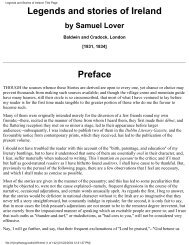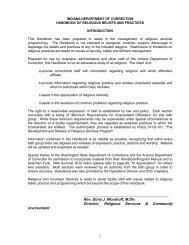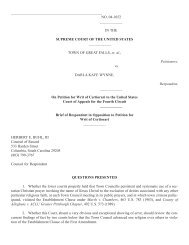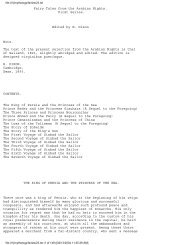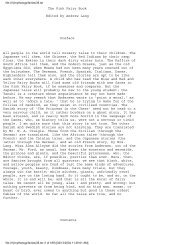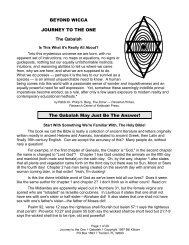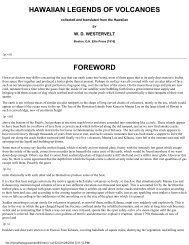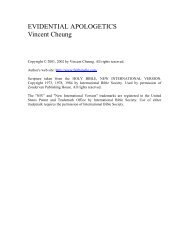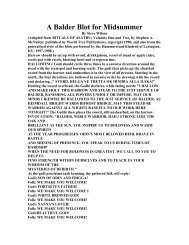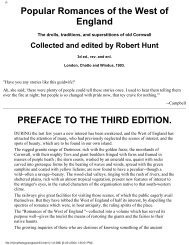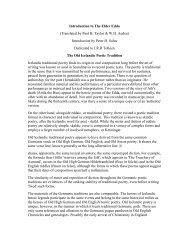Tales and Traditions of the Eskimo - Alternative Religions ...
Tales and Traditions of the Eskimo - Alternative Religions ...
Tales and Traditions of the Eskimo - Alternative Religions ...
You also want an ePaper? Increase the reach of your titles
YUMPU automatically turns print PDFs into web optimized ePapers that Google loves.
<strong>Tales</strong> <strong>and</strong> <strong>Traditions</strong> <strong>of</strong> <strong>the</strong> <strong>Eskimo</strong> - Title Page<br />
dluarpo8, well, sufficiently; ingerdlavo8, it moves; ingerdlavdluarpo8, it goes quick.<br />
ngârpo8, highly; angivo8, it is large; angingârpo8, is very large.<br />
tarpo8, repeatedly or using to.<br />
juipo8, never.<br />
gajugpo8, is bending to, likes to.<br />
b. Intransitive.<br />
narpo8, is to make one; masagpo8, is wet; masangnarpo8, is to grow wet from.<br />
c. Transitive.<br />
tipâ, causes him to; autdlarpo8, goes away; autdlartípá, he sends him away.<br />
r8uvâ, comm<strong>and</strong>s or wishes that he.<br />
serpâ, waits till he; tikipo8, he comes; tikitserpâ, is waiting till he comes.<br />
p. 21<br />
It is by combining a series <strong>of</strong> <strong>the</strong>se added stems to <strong>the</strong> principal stem, that such an extraordinary<br />
complexity <strong>of</strong> ideas can be conveyed in a single word. Only <strong>the</strong> more intelligent, however, are perfectly<br />
skilled in this operation, <strong>and</strong> <strong>the</strong> number <strong>of</strong> affixes attached to one primitive stem seldom amounts to ten.<br />
The order in which <strong>the</strong>y are linked to one ano<strong>the</strong>r depends on <strong>the</strong> meaning, besides certain particular<br />
rules for each <strong>of</strong> <strong>the</strong>m; but <strong>the</strong>y are always put after <strong>the</strong> primitive stem, <strong>and</strong> <strong>the</strong> flexion always ends <strong>the</strong><br />
word. The total number <strong>of</strong> affixes is about two hundred. As a sample, we shall try here to compose a<br />
word <strong>of</strong> some <strong>of</strong> <strong>the</strong> stems given above<br />
igdlor-ssua-tsia-lior-fi-gssa-liar-8u-gamiuk.<br />
This word consists <strong>of</strong> a primitive stem, seven affixes, <strong>and</strong> lastly <strong>the</strong> flexion for <strong>the</strong> third person<br />
conjunctive with <strong>the</strong> suffix for him. It signifiesas he comm<strong>and</strong>ed (or wished) him to go to <strong>the</strong> place,<br />
where <strong>the</strong> tolerably large house shall be built.<br />
igdlu-gssar-si-ni-uti-ger-8u-vara.<br />
This word is constructed <strong>of</strong> one primitive <strong>and</strong> six additional stems, with <strong>the</strong> flexion for <strong>the</strong> first person<br />
indicative, <strong>and</strong> <strong>the</strong> suffix for him or it, <strong>and</strong> signifiesI ordered him to use it as a means for buying<br />
(endeavouring to get) house-materials (a future house).<br />
Syntax.In consequence <strong>of</strong> what has been explained above, much <strong>of</strong> what in o<strong>the</strong>r dialects belongs to<br />
syntax, in Greenl<strong>and</strong> is represented by composing words <strong>and</strong> by flexion. There is a very sharp distinction<br />
between <strong>the</strong> verbs as transitive, intransitive, or having both qualities at once. The exclusively transitive<br />
verbs always require a suffix; where this is wanting <strong>the</strong>y grow reflectivefor instance, to8úpâ, he killed<br />
him; but to8úpo8, he killed, always supposes himself.<br />
Among <strong>the</strong> seven moods <strong>of</strong> <strong>the</strong> verb, <strong>the</strong> infinitive <strong>and</strong> <strong>the</strong> participle do not exactly correspond to what<br />
are p. 22 so called in o<strong>the</strong>r languages. The infinitive is very <strong>of</strong>ten used like <strong>the</strong> participle in a run <strong>of</strong><br />
sentences, to express what in o<strong>the</strong>r tongues is obtained by help <strong>of</strong> while, <strong>the</strong>n, as, during, &c, The<br />
file:///I|/mythology/american indian/24/24.html (20 <strong>of</strong> 317) [01/24/2004 8:57:48 AM]



